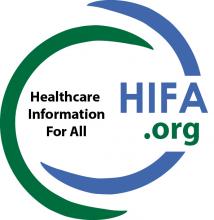
Quote of the month: “It’s true that environmental degradation is surrounding us in all we do and all we eat and it seems that there is no escape. The impact of all this on health of people is enormous and cannot be ignored."(HIFA Steering Group member Najeeb Al-Shorbaji, Jordan)
International health conferences are hugely damaging in terms of CO2 emissions. A recent paper in The Lancet drew attention to the 'inconsistency between undertaking work to promote sustainable development and travelling in a way that undermines sustainability'. During December 2019, HIFA members discussed issues around improving collaboration, communication and cooperation, whilst reducing impact on environment and climate.
“The answer surely must be to have ‘fewer’ physical conferences and to invest more in virtual communication”, HIFA coordinator Neil Pakenham-Walsh told the HIFA forum. He highlighted the potential of virtual communities of practice such as HIFA to promote communication and collaboration, whilst being less expensive, much less environmentally damaging and much more inclusive than physical conferences. This doesn’t mean that physical conferences will become obsolete; on the contrary, Neil believes that they can be effectively complemented by virtual communication, as demonstrated by the recent HIFA discussion in the run-up to the Dhaka Symposium on Community Health Workers (November 2019).
Whilst agreeing that air travel should be minimised, Stewart Britten (HIFA member, UK), cautioned that face-to-face exchange was “so valuable that it would be a risk to dispense with it completely”, particularly when there are sensitive issues to discuss. Face-to-face interaction is vital to get the ‘chemistry’ right in such situations. From his point of view, virtual communication still has drawbacks. “My experience of webinars has been unsatisfactory and I feel sure they could be improved on”, he told the HIFA forum. “If one is simply tuned in to a physical meeting, as well as sometimes having difficulty in hearing the discussion, the experience is surely one of feeling, as well as being, remote, with one’s virtual presence forgotten”.
Getting the right balance between physical and virtual communication is definitely a vital step towards reducing environmental damage caused by air travel. But a change in mindset is also needed if this model is to succeed. Stewart Britten identified a dichotomy: “Though we know the harm to the planet from flying and any travel that burns fossil fuels, it seems that most of us tend to see what we ourselves do as being so important that we should be an exception.” He posed the question, “can doctors and nurses actually use such respect as we may have in the public eye by setting an example in reducing our flying?” Later this year, HIFA is planning to help persuade health professionals and their professional bodies to do so.
On September 14-16, the International Conference on Physician Health 2020 will take place in London, attended by many national medical associations from around the world. Erica Frank (HIFA member, Canada) sees it as an opportunity to ‘walk the talk’ on climate change. “While all these medical organizations have made enthusiastic policy commitments to reducing climate change”, she told the HIFA forum, “there remains an enormous carbon footprint around travel for the meetings all these organisations regularly sponsor, and the countless others their members regularly attend”.
HIFA is looking to collaborate with other organisations that are already working on these issues. If you or your organisation/network are planning activities relevant to the issues highlighted in this blog, we would very much like to hear from you. Please contact the HIFA Coordinator, Dr Neil Pakenham-Walsh on neil(at)hifa(dot)org
Metrics: In December 2019 HIFA (English) exchanged 136 messages from 59 contributors in 24 countries (Afghanistan, Bangladesh, Canada, Egypt, France, Honduras, India, Jordan, Kenya, Madagascar, Mozambique, Nepal, Netherlands, Nigeria, Pakistan, South Africa, Sri Lanka, Switzerland, Tanzania, Uganda, UK, USA, Zambia, Zimbabwe). Our top contributors were Joseph Ana, Nigeria (16) and Massimo Serventi, Tanzania (4). Thank you all for sharing your views and your experience.
Martin Carroll was previously Head of the International Department at the British Medical Association, London UK, and has worked on issues affecting health in LMICs since 2003. He represented the BMA on the HIFA Steering Group from 2008-16 and is now an independent HIFA Steering Group member. Martin is a member of three HIFA working groups: Multilingualism, Evaluating the Impact of Healthcare Information, and Social Media. He is also the HIFA blogger. Twitter: @MMCarroll

